Bullying in Nursing: Professional Issue, Accountability and Safety
VerifiedAdded on 2023/06/13
|10
|3030
|368
Essay
AI Summary
This essay addresses the pervasive issue of bullying within the nursing profession, defining it as a pattern of destructive behavior that undermines patient care and compromises the well-being of nursing professionals. It highlights the psychological and physical consequences of bullying, including low self-esteem, stress, anxiety, and potential physical ailments, which can lead to absenteeism, reduced productivity, and high turnover rates. The essay further discusses the indirect effects of bullying on patient safety, such as impaired teamwork, communication breakdowns, and increased risk of medication errors, ultimately affecting the quality of patient care and satisfaction. Strategies to mitigate bullying, such as implementing zero-tolerance policies, fostering a caring organizational culture, and empowering nursing staff through leadership, are proposed to improve nursing practice and ensure patient safety. Desklib offers a wealth of resources, including similar essays and study tools, to support students in understanding and addressing critical healthcare issues.
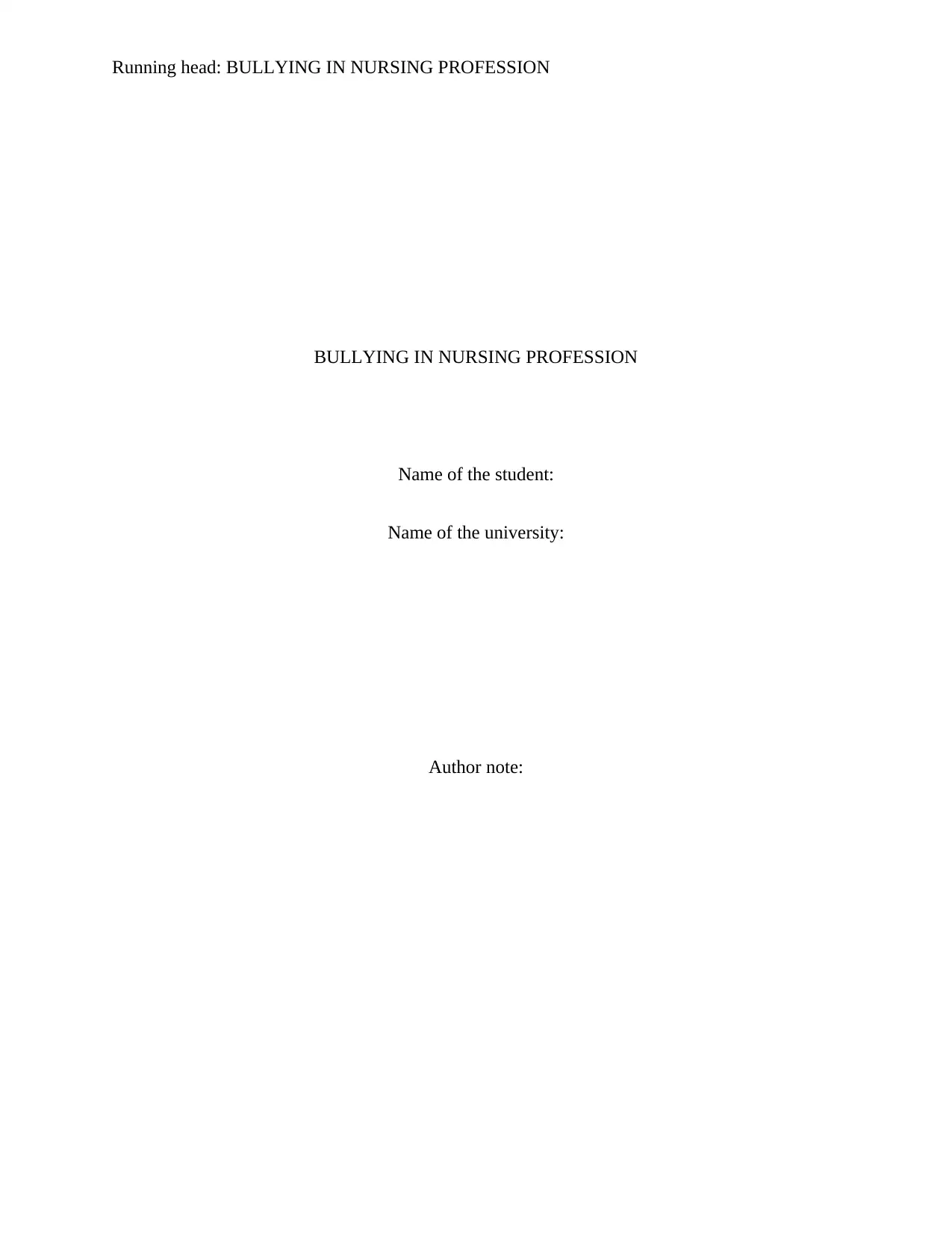
Running head: BULLYING IN NURSING PROFESSION
BULLYING IN NURSING PROFESSION
Name of the student:
Name of the university:
Author note:
BULLYING IN NURSING PROFESSION
Name of the student:
Name of the university:
Author note:
Paraphrase This Document
Need a fresh take? Get an instant paraphrase of this document with our AI Paraphraser
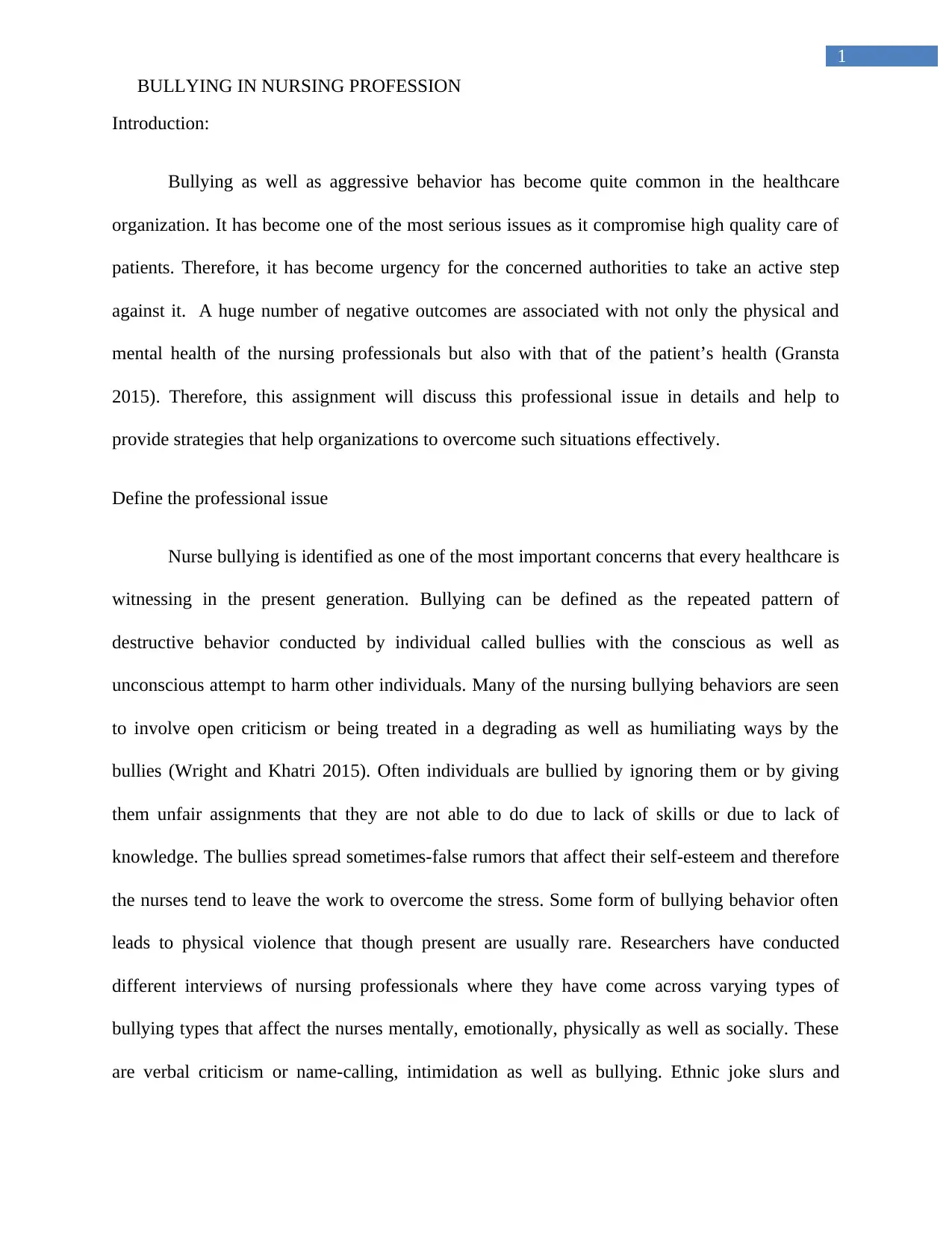
1
BULLYING IN NURSING PROFESSION
Introduction:
Bullying as well as aggressive behavior has become quite common in the healthcare
organization. It has become one of the most serious issues as it compromise high quality care of
patients. Therefore, it has become urgency for the concerned authorities to take an active step
against it. A huge number of negative outcomes are associated with not only the physical and
mental health of the nursing professionals but also with that of the patient’s health (Gransta
2015). Therefore, this assignment will discuss this professional issue in details and help to
provide strategies that help organizations to overcome such situations effectively.
Define the professional issue
Nurse bullying is identified as one of the most important concerns that every healthcare is
witnessing in the present generation. Bullying can be defined as the repeated pattern of
destructive behavior conducted by individual called bullies with the conscious as well as
unconscious attempt to harm other individuals. Many of the nursing bullying behaviors are seen
to involve open criticism or being treated in a degrading as well as humiliating ways by the
bullies (Wright and Khatri 2015). Often individuals are bullied by ignoring them or by giving
them unfair assignments that they are not able to do due to lack of skills or due to lack of
knowledge. The bullies spread sometimes-false rumors that affect their self-esteem and therefore
the nurses tend to leave the work to overcome the stress. Some form of bullying behavior often
leads to physical violence that though present are usually rare. Researchers have conducted
different interviews of nursing professionals where they have come across varying types of
bullying types that affect the nurses mentally, emotionally, physically as well as socially. These
are verbal criticism or name-calling, intimidation as well as bullying. Ethnic joke slurs and
BULLYING IN NURSING PROFESSION
Introduction:
Bullying as well as aggressive behavior has become quite common in the healthcare
organization. It has become one of the most serious issues as it compromise high quality care of
patients. Therefore, it has become urgency for the concerned authorities to take an active step
against it. A huge number of negative outcomes are associated with not only the physical and
mental health of the nursing professionals but also with that of the patient’s health (Gransta
2015). Therefore, this assignment will discuss this professional issue in details and help to
provide strategies that help organizations to overcome such situations effectively.
Define the professional issue
Nurse bullying is identified as one of the most important concerns that every healthcare is
witnessing in the present generation. Bullying can be defined as the repeated pattern of
destructive behavior conducted by individual called bullies with the conscious as well as
unconscious attempt to harm other individuals. Many of the nursing bullying behaviors are seen
to involve open criticism or being treated in a degrading as well as humiliating ways by the
bullies (Wright and Khatri 2015). Often individuals are bullied by ignoring them or by giving
them unfair assignments that they are not able to do due to lack of skills or due to lack of
knowledge. The bullies spread sometimes-false rumors that affect their self-esteem and therefore
the nurses tend to leave the work to overcome the stress. Some form of bullying behavior often
leads to physical violence that though present are usually rare. Researchers have conducted
different interviews of nursing professionals where they have come across varying types of
bullying types that affect the nurses mentally, emotionally, physically as well as socially. These
are verbal criticism or name-calling, intimidation as well as bullying. Ethnic joke slurs and
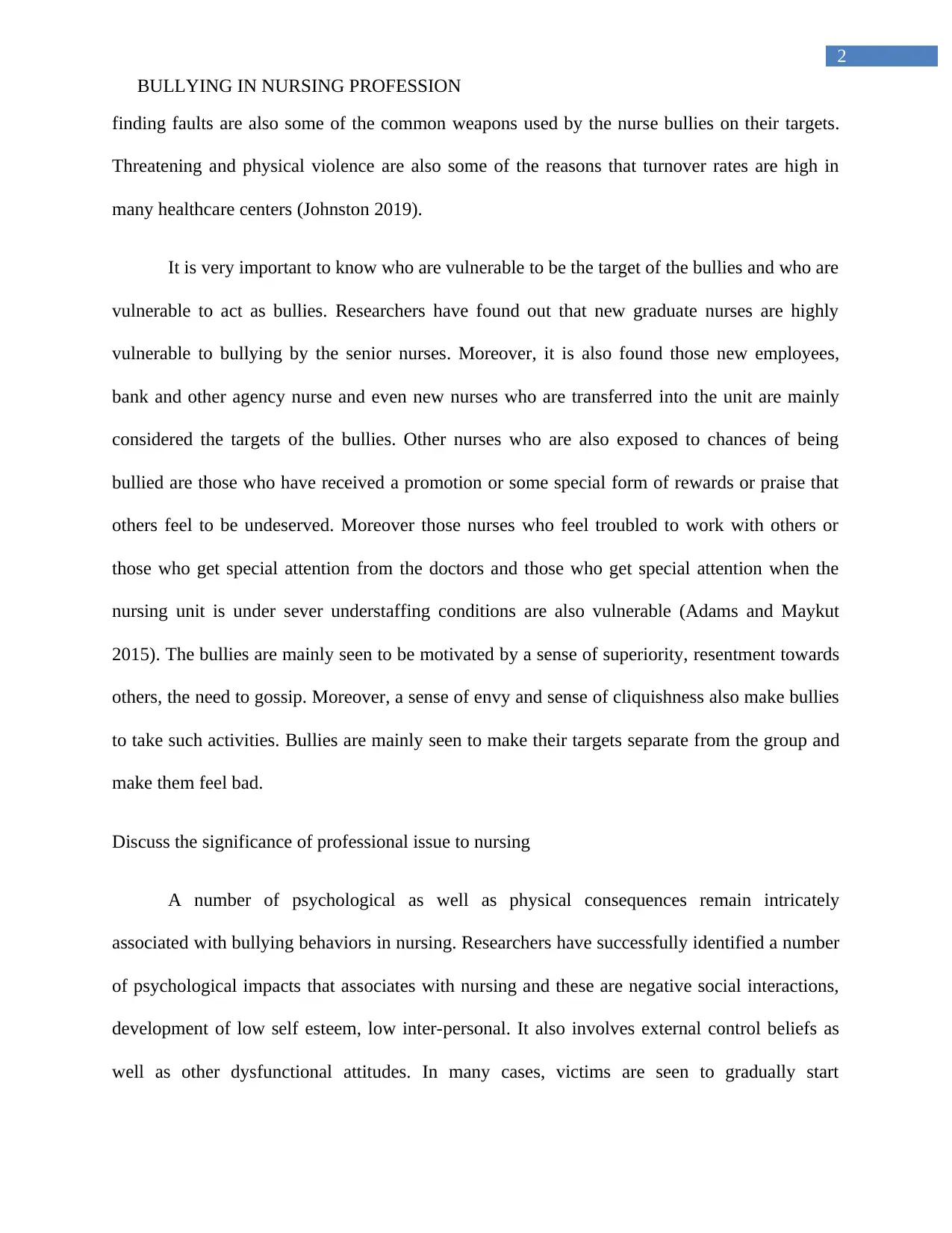
2
BULLYING IN NURSING PROFESSION
finding faults are also some of the common weapons used by the nurse bullies on their targets.
Threatening and physical violence are also some of the reasons that turnover rates are high in
many healthcare centers (Johnston 2019).
It is very important to know who are vulnerable to be the target of the bullies and who are
vulnerable to act as bullies. Researchers have found out that new graduate nurses are highly
vulnerable to bullying by the senior nurses. Moreover, it is also found those new employees,
bank and other agency nurse and even new nurses who are transferred into the unit are mainly
considered the targets of the bullies. Other nurses who are also exposed to chances of being
bullied are those who have received a promotion or some special form of rewards or praise that
others feel to be undeserved. Moreover those nurses who feel troubled to work with others or
those who get special attention from the doctors and those who get special attention when the
nursing unit is under sever understaffing conditions are also vulnerable (Adams and Maykut
2015). The bullies are mainly seen to be motivated by a sense of superiority, resentment towards
others, the need to gossip. Moreover, a sense of envy and sense of cliquishness also make bullies
to take such activities. Bullies are mainly seen to make their targets separate from the group and
make them feel bad.
Discuss the significance of professional issue to nursing
A number of psychological as well as physical consequences remain intricately
associated with bullying behaviors in nursing. Researchers have successfully identified a number
of psychological impacts that associates with nursing and these are negative social interactions,
development of low self esteem, low inter-personal. It also involves external control beliefs as
well as other dysfunctional attitudes. In many cases, victims are seen to gradually start
BULLYING IN NURSING PROFESSION
finding faults are also some of the common weapons used by the nurse bullies on their targets.
Threatening and physical violence are also some of the reasons that turnover rates are high in
many healthcare centers (Johnston 2019).
It is very important to know who are vulnerable to be the target of the bullies and who are
vulnerable to act as bullies. Researchers have found out that new graduate nurses are highly
vulnerable to bullying by the senior nurses. Moreover, it is also found those new employees,
bank and other agency nurse and even new nurses who are transferred into the unit are mainly
considered the targets of the bullies. Other nurses who are also exposed to chances of being
bullied are those who have received a promotion or some special form of rewards or praise that
others feel to be undeserved. Moreover those nurses who feel troubled to work with others or
those who get special attention from the doctors and those who get special attention when the
nursing unit is under sever understaffing conditions are also vulnerable (Adams and Maykut
2015). The bullies are mainly seen to be motivated by a sense of superiority, resentment towards
others, the need to gossip. Moreover, a sense of envy and sense of cliquishness also make bullies
to take such activities. Bullies are mainly seen to make their targets separate from the group and
make them feel bad.
Discuss the significance of professional issue to nursing
A number of psychological as well as physical consequences remain intricately
associated with bullying behaviors in nursing. Researchers have successfully identified a number
of psychological impacts that associates with nursing and these are negative social interactions,
development of low self esteem, low inter-personal. It also involves external control beliefs as
well as other dysfunctional attitudes. In many cases, victims are seen to gradually start
⊘ This is a preview!⊘
Do you want full access?
Subscribe today to unlock all pages.

Trusted by 1+ million students worldwide
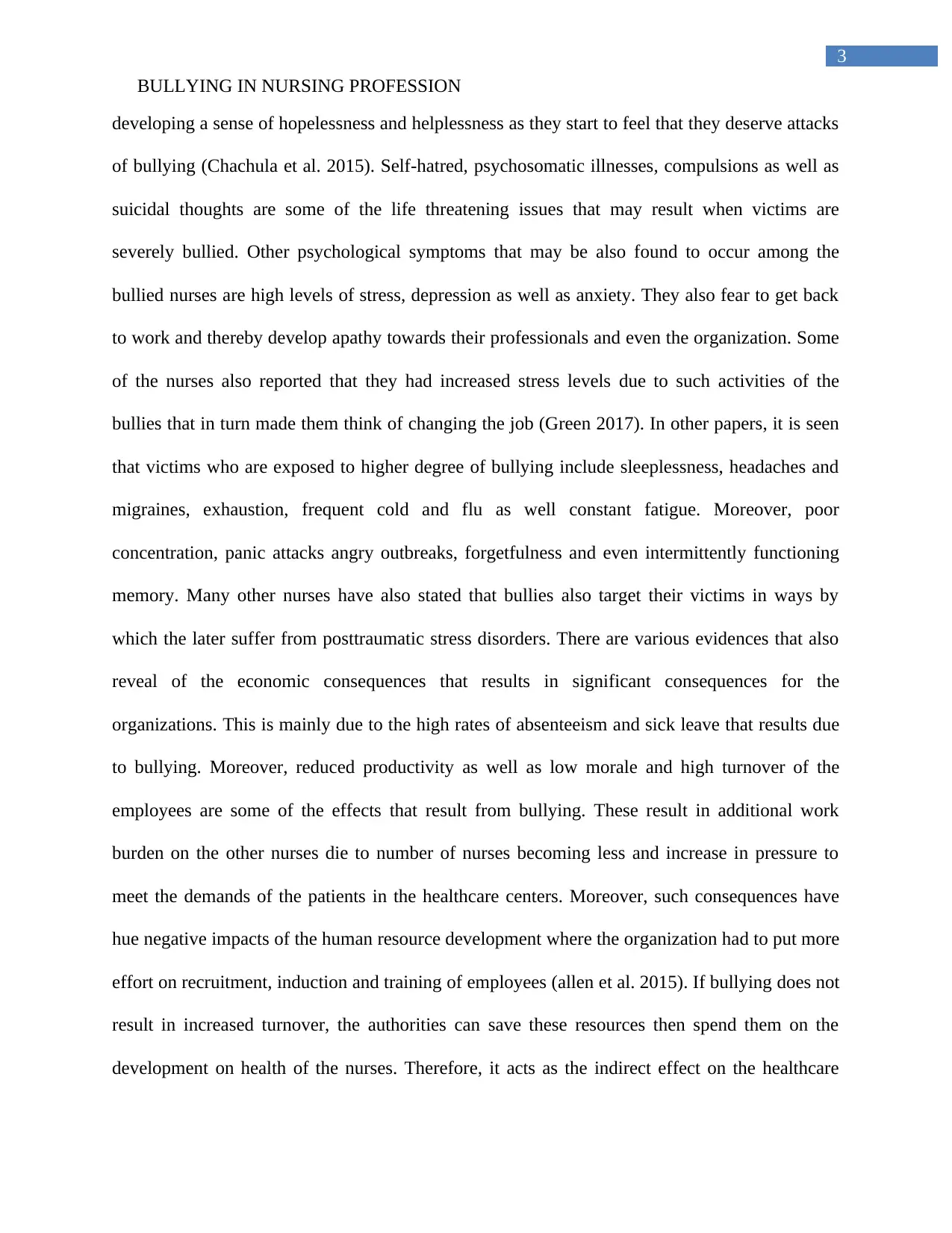
3
BULLYING IN NURSING PROFESSION
developing a sense of hopelessness and helplessness as they start to feel that they deserve attacks
of bullying (Chachula et al. 2015). Self-hatred, psychosomatic illnesses, compulsions as well as
suicidal thoughts are some of the life threatening issues that may result when victims are
severely bullied. Other psychological symptoms that may be also found to occur among the
bullied nurses are high levels of stress, depression as well as anxiety. They also fear to get back
to work and thereby develop apathy towards their professionals and even the organization. Some
of the nurses also reported that they had increased stress levels due to such activities of the
bullies that in turn made them think of changing the job (Green 2017). In other papers, it is seen
that victims who are exposed to higher degree of bullying include sleeplessness, headaches and
migraines, exhaustion, frequent cold and flu as well constant fatigue. Moreover, poor
concentration, panic attacks angry outbreaks, forgetfulness and even intermittently functioning
memory. Many other nurses have also stated that bullies also target their victims in ways by
which the later suffer from posttraumatic stress disorders. There are various evidences that also
reveal of the economic consequences that results in significant consequences for the
organizations. This is mainly due to the high rates of absenteeism and sick leave that results due
to bullying. Moreover, reduced productivity as well as low morale and high turnover of the
employees are some of the effects that result from bullying. These result in additional work
burden on the other nurses die to number of nurses becoming less and increase in pressure to
meet the demands of the patients in the healthcare centers. Moreover, such consequences have
hue negative impacts of the human resource development where the organization had to put more
effort on recruitment, induction and training of employees (allen et al. 2015). If bullying does not
result in increased turnover, the authorities can save these resources then spend them on the
development on health of the nurses. Therefore, it acts as the indirect effect on the healthcare
BULLYING IN NURSING PROFESSION
developing a sense of hopelessness and helplessness as they start to feel that they deserve attacks
of bullying (Chachula et al. 2015). Self-hatred, psychosomatic illnesses, compulsions as well as
suicidal thoughts are some of the life threatening issues that may result when victims are
severely bullied. Other psychological symptoms that may be also found to occur among the
bullied nurses are high levels of stress, depression as well as anxiety. They also fear to get back
to work and thereby develop apathy towards their professionals and even the organization. Some
of the nurses also reported that they had increased stress levels due to such activities of the
bullies that in turn made them think of changing the job (Green 2017). In other papers, it is seen
that victims who are exposed to higher degree of bullying include sleeplessness, headaches and
migraines, exhaustion, frequent cold and flu as well constant fatigue. Moreover, poor
concentration, panic attacks angry outbreaks, forgetfulness and even intermittently functioning
memory. Many other nurses have also stated that bullies also target their victims in ways by
which the later suffer from posttraumatic stress disorders. There are various evidences that also
reveal of the economic consequences that results in significant consequences for the
organizations. This is mainly due to the high rates of absenteeism and sick leave that results due
to bullying. Moreover, reduced productivity as well as low morale and high turnover of the
employees are some of the effects that result from bullying. These result in additional work
burden on the other nurses die to number of nurses becoming less and increase in pressure to
meet the demands of the patients in the healthcare centers. Moreover, such consequences have
hue negative impacts of the human resource development where the organization had to put more
effort on recruitment, induction and training of employees (allen et al. 2015). If bullying does not
result in increased turnover, the authorities can save these resources then spend them on the
development on health of the nurses. Therefore, it acts as the indirect effect on the healthcare
Paraphrase This Document
Need a fresh take? Get an instant paraphrase of this document with our AI Paraphraser
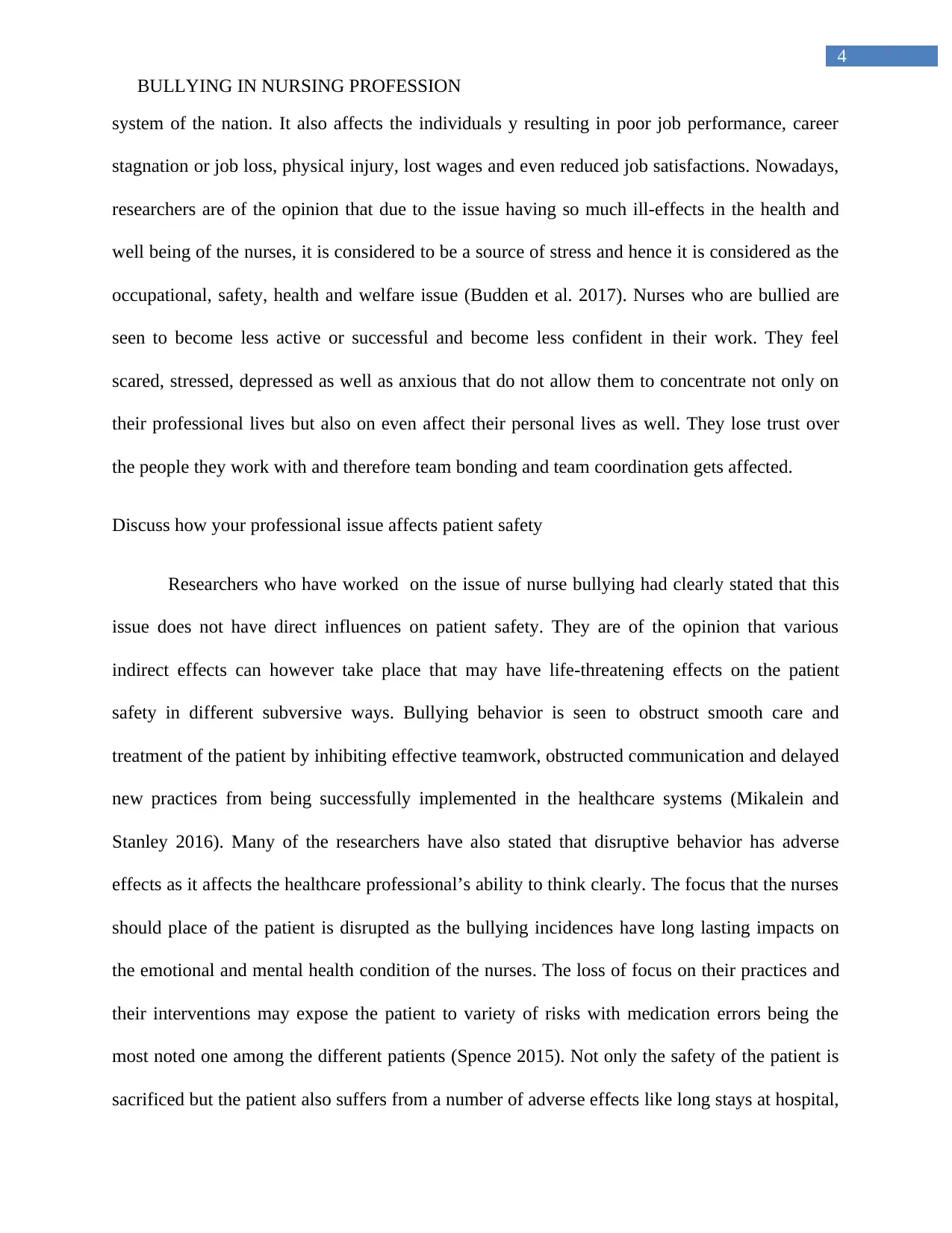
4
BULLYING IN NURSING PROFESSION
system of the nation. It also affects the individuals y resulting in poor job performance, career
stagnation or job loss, physical injury, lost wages and even reduced job satisfactions. Nowadays,
researchers are of the opinion that due to the issue having so much ill-effects in the health and
well being of the nurses, it is considered to be a source of stress and hence it is considered as the
occupational, safety, health and welfare issue (Budden et al. 2017). Nurses who are bullied are
seen to become less active or successful and become less confident in their work. They feel
scared, stressed, depressed as well as anxious that do not allow them to concentrate not only on
their professional lives but also on even affect their personal lives as well. They lose trust over
the people they work with and therefore team bonding and team coordination gets affected.
Discuss how your professional issue affects patient safety
Researchers who have worked on the issue of nurse bullying had clearly stated that this
issue does not have direct influences on patient safety. They are of the opinion that various
indirect effects can however take place that may have life-threatening effects on the patient
safety in different subversive ways. Bullying behavior is seen to obstruct smooth care and
treatment of the patient by inhibiting effective teamwork, obstructed communication and delayed
new practices from being successfully implemented in the healthcare systems (Mikalein and
Stanley 2016). Many of the researchers have also stated that disruptive behavior has adverse
effects as it affects the healthcare professional’s ability to think clearly. The focus that the nurses
should place of the patient is disrupted as the bullying incidences have long lasting impacts on
the emotional and mental health condition of the nurses. The loss of focus on their practices and
their interventions may expose the patient to variety of risks with medication errors being the
most noted one among the different patients (Spence 2015). Not only the safety of the patient is
sacrificed but the patient also suffers from a number of adverse effects like long stays at hospital,
BULLYING IN NURSING PROFESSION
system of the nation. It also affects the individuals y resulting in poor job performance, career
stagnation or job loss, physical injury, lost wages and even reduced job satisfactions. Nowadays,
researchers are of the opinion that due to the issue having so much ill-effects in the health and
well being of the nurses, it is considered to be a source of stress and hence it is considered as the
occupational, safety, health and welfare issue (Budden et al. 2017). Nurses who are bullied are
seen to become less active or successful and become less confident in their work. They feel
scared, stressed, depressed as well as anxious that do not allow them to concentrate not only on
their professional lives but also on even affect their personal lives as well. They lose trust over
the people they work with and therefore team bonding and team coordination gets affected.
Discuss how your professional issue affects patient safety
Researchers who have worked on the issue of nurse bullying had clearly stated that this
issue does not have direct influences on patient safety. They are of the opinion that various
indirect effects can however take place that may have life-threatening effects on the patient
safety in different subversive ways. Bullying behavior is seen to obstruct smooth care and
treatment of the patient by inhibiting effective teamwork, obstructed communication and delayed
new practices from being successfully implemented in the healthcare systems (Mikalein and
Stanley 2016). Many of the researchers have also stated that disruptive behavior has adverse
effects as it affects the healthcare professional’s ability to think clearly. The focus that the nurses
should place of the patient is disrupted as the bullying incidences have long lasting impacts on
the emotional and mental health condition of the nurses. The loss of focus on their practices and
their interventions may expose the patient to variety of risks with medication errors being the
most noted one among the different patients (Spence 2015). Not only the safety of the patient is
sacrificed but the patient also suffers from a number of adverse effects like long stays at hospital,
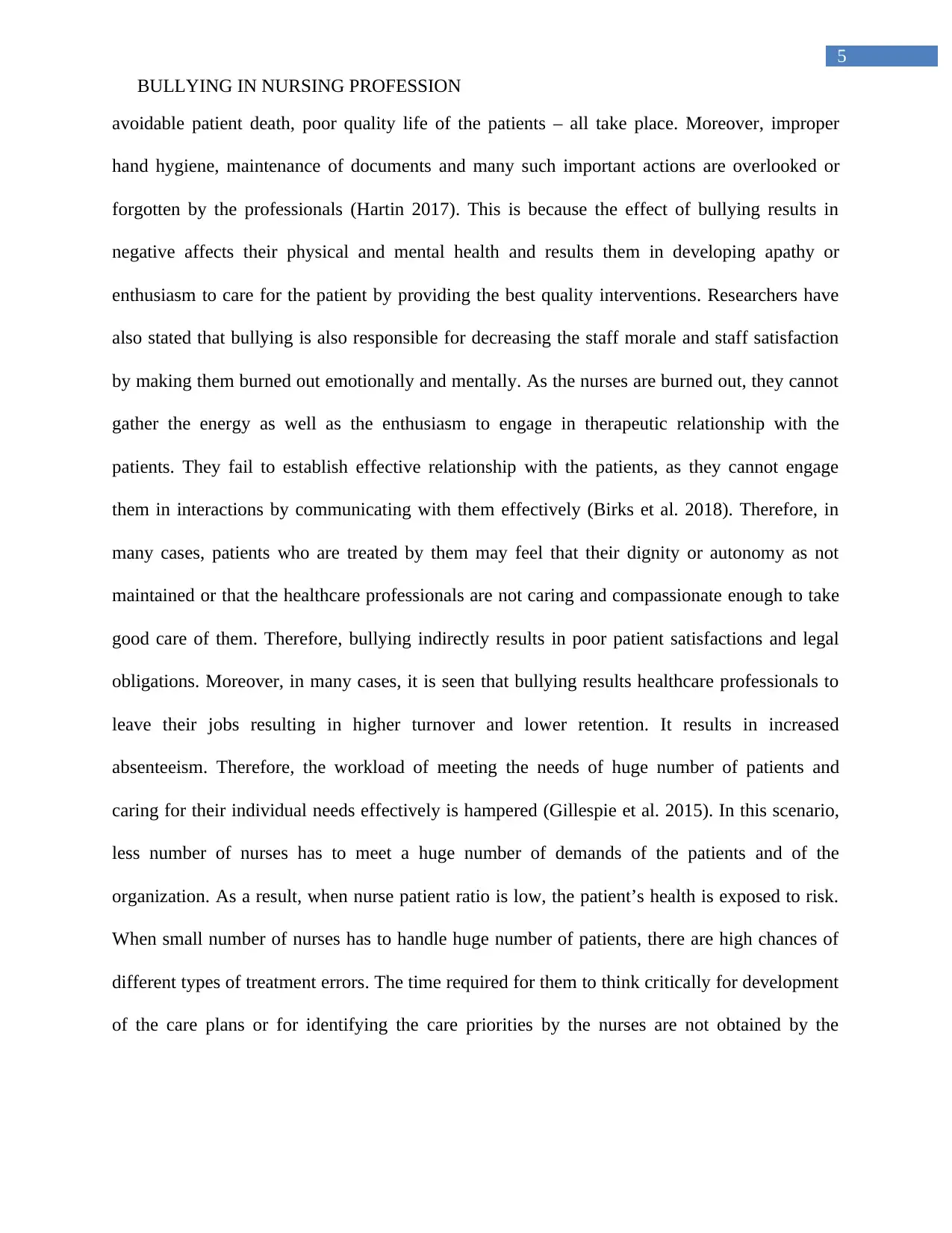
5
BULLYING IN NURSING PROFESSION
avoidable patient death, poor quality life of the patients – all take place. Moreover, improper
hand hygiene, maintenance of documents and many such important actions are overlooked or
forgotten by the professionals (Hartin 2017). This is because the effect of bullying results in
negative affects their physical and mental health and results them in developing apathy or
enthusiasm to care for the patient by providing the best quality interventions. Researchers have
also stated that bullying is also responsible for decreasing the staff morale and staff satisfaction
by making them burned out emotionally and mentally. As the nurses are burned out, they cannot
gather the energy as well as the enthusiasm to engage in therapeutic relationship with the
patients. They fail to establish effective relationship with the patients, as they cannot engage
them in interactions by communicating with them effectively (Birks et al. 2018). Therefore, in
many cases, patients who are treated by them may feel that their dignity or autonomy as not
maintained or that the healthcare professionals are not caring and compassionate enough to take
good care of them. Therefore, bullying indirectly results in poor patient satisfactions and legal
obligations. Moreover, in many cases, it is seen that bullying results healthcare professionals to
leave their jobs resulting in higher turnover and lower retention. It results in increased
absenteeism. Therefore, the workload of meeting the needs of huge number of patients and
caring for their individual needs effectively is hampered (Gillespie et al. 2015). In this scenario,
less number of nurses has to meet a huge number of demands of the patients and of the
organization. As a result, when nurse patient ratio is low, the patient’s health is exposed to risk.
When small number of nurses has to handle huge number of patients, there are high chances of
different types of treatment errors. The time required for them to think critically for development
of the care plans or for identifying the care priorities by the nurses are not obtained by the
BULLYING IN NURSING PROFESSION
avoidable patient death, poor quality life of the patients – all take place. Moreover, improper
hand hygiene, maintenance of documents and many such important actions are overlooked or
forgotten by the professionals (Hartin 2017). This is because the effect of bullying results in
negative affects their physical and mental health and results them in developing apathy or
enthusiasm to care for the patient by providing the best quality interventions. Researchers have
also stated that bullying is also responsible for decreasing the staff morale and staff satisfaction
by making them burned out emotionally and mentally. As the nurses are burned out, they cannot
gather the energy as well as the enthusiasm to engage in therapeutic relationship with the
patients. They fail to establish effective relationship with the patients, as they cannot engage
them in interactions by communicating with them effectively (Birks et al. 2018). Therefore, in
many cases, patients who are treated by them may feel that their dignity or autonomy as not
maintained or that the healthcare professionals are not caring and compassionate enough to take
good care of them. Therefore, bullying indirectly results in poor patient satisfactions and legal
obligations. Moreover, in many cases, it is seen that bullying results healthcare professionals to
leave their jobs resulting in higher turnover and lower retention. It results in increased
absenteeism. Therefore, the workload of meeting the needs of huge number of patients and
caring for their individual needs effectively is hampered (Gillespie et al. 2015). In this scenario,
less number of nurses has to meet a huge number of demands of the patients and of the
organization. As a result, when nurse patient ratio is low, the patient’s health is exposed to risk.
When small number of nurses has to handle huge number of patients, there are high chances of
different types of treatment errors. The time required for them to think critically for development
of the care plans or for identifying the care priorities by the nurses are not obtained by the
⊘ This is a preview!⊘
Do you want full access?
Subscribe today to unlock all pages.

Trusted by 1+ million students worldwide
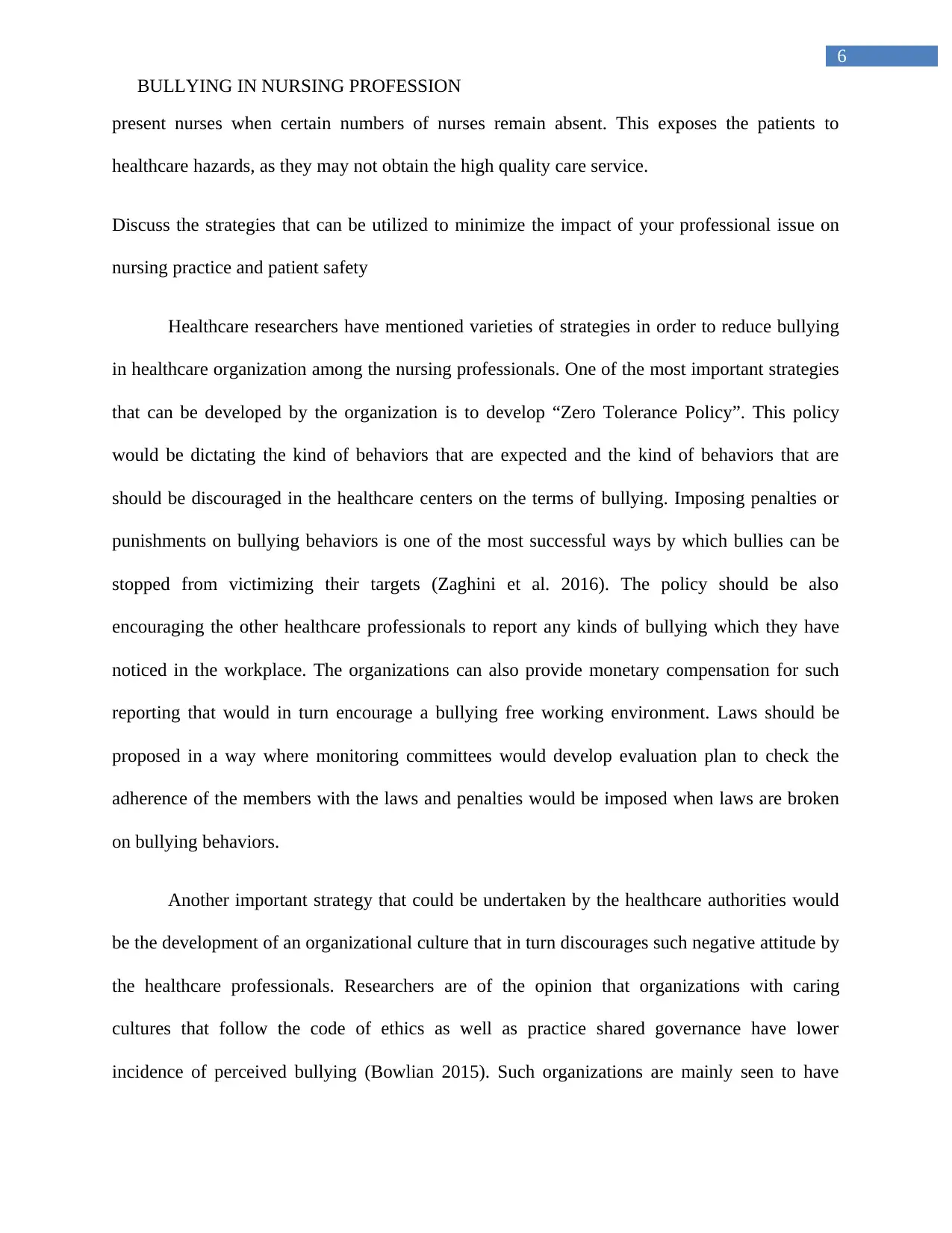
6
BULLYING IN NURSING PROFESSION
present nurses when certain numbers of nurses remain absent. This exposes the patients to
healthcare hazards, as they may not obtain the high quality care service.
Discuss the strategies that can be utilized to minimize the impact of your professional issue on
nursing practice and patient safety
Healthcare researchers have mentioned varieties of strategies in order to reduce bullying
in healthcare organization among the nursing professionals. One of the most important strategies
that can be developed by the organization is to develop “Zero Tolerance Policy”. This policy
would be dictating the kind of behaviors that are expected and the kind of behaviors that are
should be discouraged in the healthcare centers on the terms of bullying. Imposing penalties or
punishments on bullying behaviors is one of the most successful ways by which bullies can be
stopped from victimizing their targets (Zaghini et al. 2016). The policy should be also
encouraging the other healthcare professionals to report any kinds of bullying which they have
noticed in the workplace. The organizations can also provide monetary compensation for such
reporting that would in turn encourage a bullying free working environment. Laws should be
proposed in a way where monitoring committees would develop evaluation plan to check the
adherence of the members with the laws and penalties would be imposed when laws are broken
on bullying behaviors.
Another important strategy that could be undertaken by the healthcare authorities would
be the development of an organizational culture that in turn discourages such negative attitude by
the healthcare professionals. Researchers are of the opinion that organizations with caring
cultures that follow the code of ethics as well as practice shared governance have lower
incidence of perceived bullying (Bowlian 2015). Such organizations are mainly seen to have
BULLYING IN NURSING PROFESSION
present nurses when certain numbers of nurses remain absent. This exposes the patients to
healthcare hazards, as they may not obtain the high quality care service.
Discuss the strategies that can be utilized to minimize the impact of your professional issue on
nursing practice and patient safety
Healthcare researchers have mentioned varieties of strategies in order to reduce bullying
in healthcare organization among the nursing professionals. One of the most important strategies
that can be developed by the organization is to develop “Zero Tolerance Policy”. This policy
would be dictating the kind of behaviors that are expected and the kind of behaviors that are
should be discouraged in the healthcare centers on the terms of bullying. Imposing penalties or
punishments on bullying behaviors is one of the most successful ways by which bullies can be
stopped from victimizing their targets (Zaghini et al. 2016). The policy should be also
encouraging the other healthcare professionals to report any kinds of bullying which they have
noticed in the workplace. The organizations can also provide monetary compensation for such
reporting that would in turn encourage a bullying free working environment. Laws should be
proposed in a way where monitoring committees would develop evaluation plan to check the
adherence of the members with the laws and penalties would be imposed when laws are broken
on bullying behaviors.
Another important strategy that could be undertaken by the healthcare authorities would
be the development of an organizational culture that in turn discourages such negative attitude by
the healthcare professionals. Researchers are of the opinion that organizations with caring
cultures that follow the code of ethics as well as practice shared governance have lower
incidence of perceived bullying (Bowlian 2015). Such organizations are mainly seen to have
Paraphrase This Document
Need a fresh take? Get an instant paraphrase of this document with our AI Paraphraser
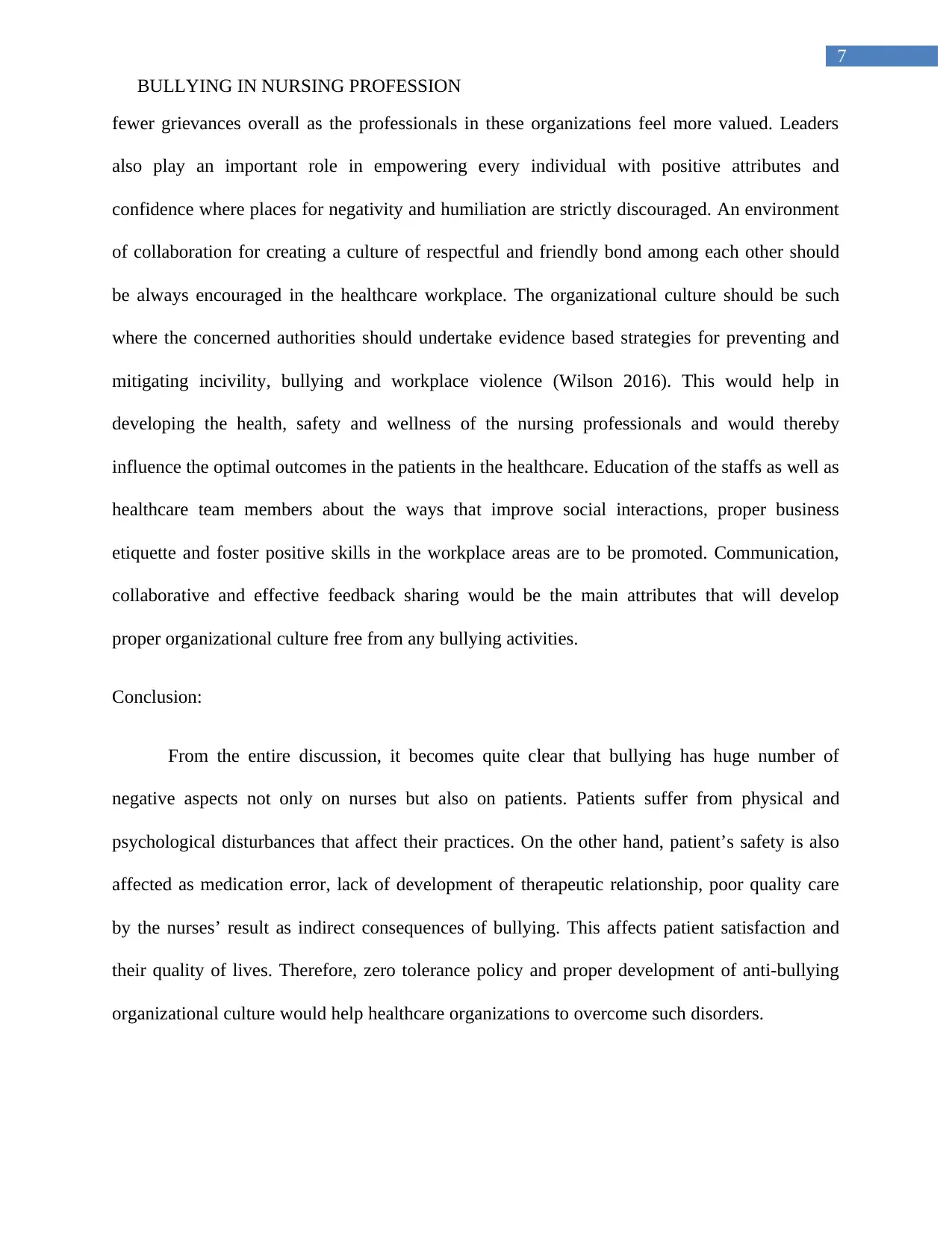
7
BULLYING IN NURSING PROFESSION
fewer grievances overall as the professionals in these organizations feel more valued. Leaders
also play an important role in empowering every individual with positive attributes and
confidence where places for negativity and humiliation are strictly discouraged. An environment
of collaboration for creating a culture of respectful and friendly bond among each other should
be always encouraged in the healthcare workplace. The organizational culture should be such
where the concerned authorities should undertake evidence based strategies for preventing and
mitigating incivility, bullying and workplace violence (Wilson 2016). This would help in
developing the health, safety and wellness of the nursing professionals and would thereby
influence the optimal outcomes in the patients in the healthcare. Education of the staffs as well as
healthcare team members about the ways that improve social interactions, proper business
etiquette and foster positive skills in the workplace areas are to be promoted. Communication,
collaborative and effective feedback sharing would be the main attributes that will develop
proper organizational culture free from any bullying activities.
Conclusion:
From the entire discussion, it becomes quite clear that bullying has huge number of
negative aspects not only on nurses but also on patients. Patients suffer from physical and
psychological disturbances that affect their practices. On the other hand, patient’s safety is also
affected as medication error, lack of development of therapeutic relationship, poor quality care
by the nurses’ result as indirect consequences of bullying. This affects patient satisfaction and
their quality of lives. Therefore, zero tolerance policy and proper development of anti-bullying
organizational culture would help healthcare organizations to overcome such disorders.
BULLYING IN NURSING PROFESSION
fewer grievances overall as the professionals in these organizations feel more valued. Leaders
also play an important role in empowering every individual with positive attributes and
confidence where places for negativity and humiliation are strictly discouraged. An environment
of collaboration for creating a culture of respectful and friendly bond among each other should
be always encouraged in the healthcare workplace. The organizational culture should be such
where the concerned authorities should undertake evidence based strategies for preventing and
mitigating incivility, bullying and workplace violence (Wilson 2016). This would help in
developing the health, safety and wellness of the nursing professionals and would thereby
influence the optimal outcomes in the patients in the healthcare. Education of the staffs as well as
healthcare team members about the ways that improve social interactions, proper business
etiquette and foster positive skills in the workplace areas are to be promoted. Communication,
collaborative and effective feedback sharing would be the main attributes that will develop
proper organizational culture free from any bullying activities.
Conclusion:
From the entire discussion, it becomes quite clear that bullying has huge number of
negative aspects not only on nurses but also on patients. Patients suffer from physical and
psychological disturbances that affect their practices. On the other hand, patient’s safety is also
affected as medication error, lack of development of therapeutic relationship, poor quality care
by the nurses’ result as indirect consequences of bullying. This affects patient satisfaction and
their quality of lives. Therefore, zero tolerance policy and proper development of anti-bullying
organizational culture would help healthcare organizations to overcome such disorders.
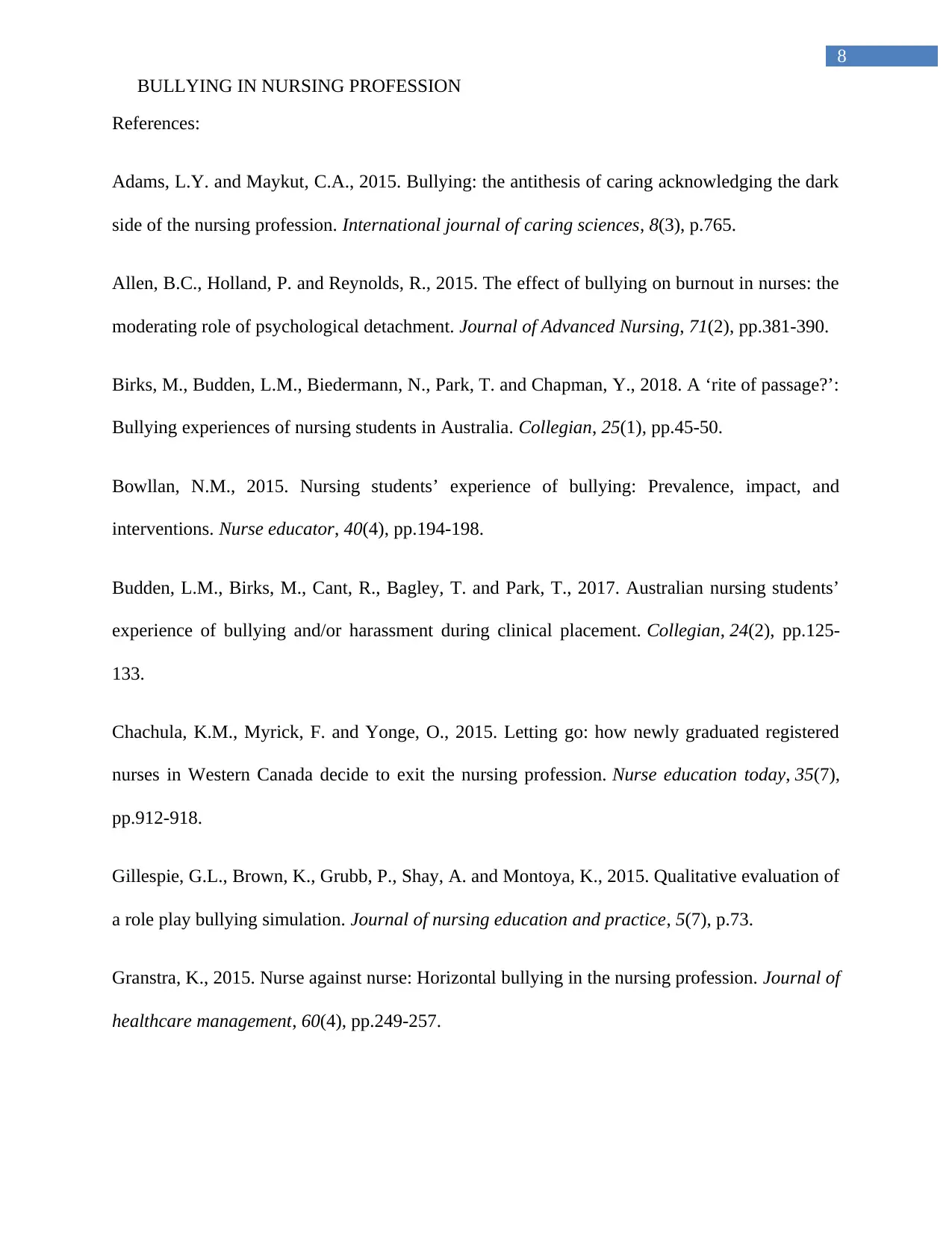
8
BULLYING IN NURSING PROFESSION
References:
Adams, L.Y. and Maykut, C.A., 2015. Bullying: the antithesis of caring acknowledging the dark
side of the nursing profession. International journal of caring sciences, 8(3), p.765.
Allen, B.C., Holland, P. and Reynolds, R., 2015. The effect of bullying on burnout in nurses: the
moderating role of psychological detachment. Journal of Advanced Nursing, 71(2), pp.381-390.
Birks, M., Budden, L.M., Biedermann, N., Park, T. and Chapman, Y., 2018. A ‘rite of passage?’:
Bullying experiences of nursing students in Australia. Collegian, 25(1), pp.45-50.
Bowllan, N.M., 2015. Nursing students’ experience of bullying: Prevalence, impact, and
interventions. Nurse educator, 40(4), pp.194-198.
Budden, L.M., Birks, M., Cant, R., Bagley, T. and Park, T., 2017. Australian nursing students’
experience of bullying and/or harassment during clinical placement. Collegian, 24(2), pp.125-
133.
Chachula, K.M., Myrick, F. and Yonge, O., 2015. Letting go: how newly graduated registered
nurses in Western Canada decide to exit the nursing profession. Nurse education today, 35(7),
pp.912-918.
Gillespie, G.L., Brown, K., Grubb, P., Shay, A. and Montoya, K., 2015. Qualitative evaluation of
a role play bullying simulation. Journal of nursing education and practice, 5(7), p.73.
Granstra, K., 2015. Nurse against nurse: Horizontal bullying in the nursing profession. Journal of
healthcare management, 60(4), pp.249-257.
BULLYING IN NURSING PROFESSION
References:
Adams, L.Y. and Maykut, C.A., 2015. Bullying: the antithesis of caring acknowledging the dark
side of the nursing profession. International journal of caring sciences, 8(3), p.765.
Allen, B.C., Holland, P. and Reynolds, R., 2015. The effect of bullying on burnout in nurses: the
moderating role of psychological detachment. Journal of Advanced Nursing, 71(2), pp.381-390.
Birks, M., Budden, L.M., Biedermann, N., Park, T. and Chapman, Y., 2018. A ‘rite of passage?’:
Bullying experiences of nursing students in Australia. Collegian, 25(1), pp.45-50.
Bowllan, N.M., 2015. Nursing students’ experience of bullying: Prevalence, impact, and
interventions. Nurse educator, 40(4), pp.194-198.
Budden, L.M., Birks, M., Cant, R., Bagley, T. and Park, T., 2017. Australian nursing students’
experience of bullying and/or harassment during clinical placement. Collegian, 24(2), pp.125-
133.
Chachula, K.M., Myrick, F. and Yonge, O., 2015. Letting go: how newly graduated registered
nurses in Western Canada decide to exit the nursing profession. Nurse education today, 35(7),
pp.912-918.
Gillespie, G.L., Brown, K., Grubb, P., Shay, A. and Montoya, K., 2015. Qualitative evaluation of
a role play bullying simulation. Journal of nursing education and practice, 5(7), p.73.
Granstra, K., 2015. Nurse against nurse: Horizontal bullying in the nursing profession. Journal of
healthcare management, 60(4), pp.249-257.
⊘ This is a preview!⊘
Do you want full access?
Subscribe today to unlock all pages.

Trusted by 1+ million students worldwide
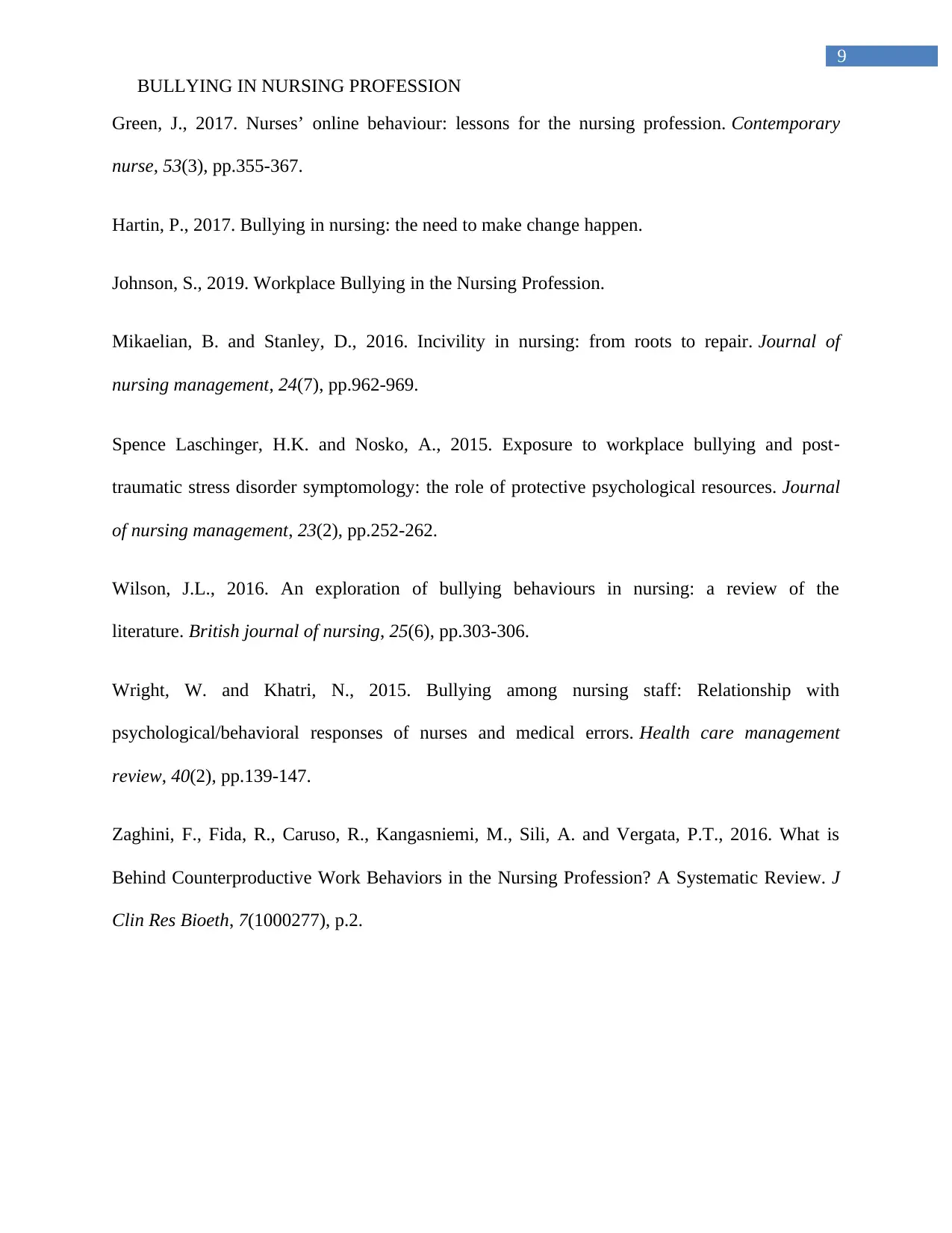
9
BULLYING IN NURSING PROFESSION
Green, J., 2017. Nurses’ online behaviour: lessons for the nursing profession. Contemporary
nurse, 53(3), pp.355-367.
Hartin, P., 2017. Bullying in nursing: the need to make change happen.
Johnson, S., 2019. Workplace Bullying in the Nursing Profession.
Mikaelian, B. and Stanley, D., 2016. Incivility in nursing: from roots to repair. Journal of
nursing management, 24(7), pp.962-969.
Spence Laschinger, H.K. and Nosko, A., 2015. Exposure to workplace bullying and post‐
traumatic stress disorder symptomology: the role of protective psychological resources. Journal
of nursing management, 23(2), pp.252-262.
Wilson, J.L., 2016. An exploration of bullying behaviours in nursing: a review of the
literature. British journal of nursing, 25(6), pp.303-306.
Wright, W. and Khatri, N., 2015. Bullying among nursing staff: Relationship with
psychological/behavioral responses of nurses and medical errors. Health care management
review, 40(2), pp.139-147.
Zaghini, F., Fida, R., Caruso, R., Kangasniemi, M., Sili, A. and Vergata, P.T., 2016. What is
Behind Counterproductive Work Behaviors in the Nursing Profession? A Systematic Review. J
Clin Res Bioeth, 7(1000277), p.2.
BULLYING IN NURSING PROFESSION
Green, J., 2017. Nurses’ online behaviour: lessons for the nursing profession. Contemporary
nurse, 53(3), pp.355-367.
Hartin, P., 2017. Bullying in nursing: the need to make change happen.
Johnson, S., 2019. Workplace Bullying in the Nursing Profession.
Mikaelian, B. and Stanley, D., 2016. Incivility in nursing: from roots to repair. Journal of
nursing management, 24(7), pp.962-969.
Spence Laschinger, H.K. and Nosko, A., 2015. Exposure to workplace bullying and post‐
traumatic stress disorder symptomology: the role of protective psychological resources. Journal
of nursing management, 23(2), pp.252-262.
Wilson, J.L., 2016. An exploration of bullying behaviours in nursing: a review of the
literature. British journal of nursing, 25(6), pp.303-306.
Wright, W. and Khatri, N., 2015. Bullying among nursing staff: Relationship with
psychological/behavioral responses of nurses and medical errors. Health care management
review, 40(2), pp.139-147.
Zaghini, F., Fida, R., Caruso, R., Kangasniemi, M., Sili, A. and Vergata, P.T., 2016. What is
Behind Counterproductive Work Behaviors in the Nursing Profession? A Systematic Review. J
Clin Res Bioeth, 7(1000277), p.2.
1 out of 10
Related Documents
Your All-in-One AI-Powered Toolkit for Academic Success.
+13062052269
info@desklib.com
Available 24*7 on WhatsApp / Email
![[object Object]](/_next/static/media/star-bottom.7253800d.svg)
Unlock your academic potential
Copyright © 2020–2026 A2Z Services. All Rights Reserved. Developed and managed by ZUCOL.





